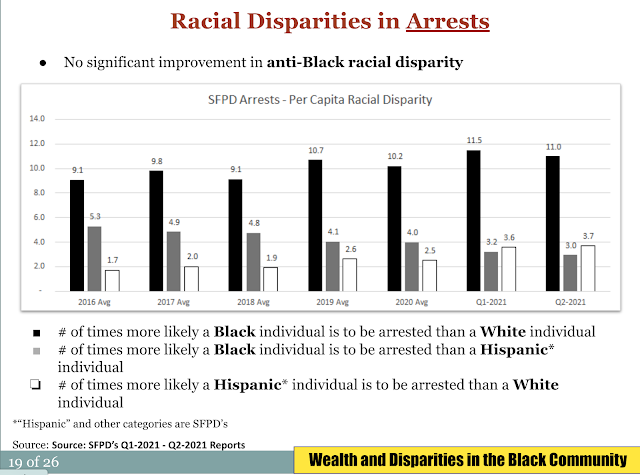San Francisco Police Commission Meetings: 2021 Summary
The San Francisco Police Commission oversees the policy, top leadership and aspects of budget decisions of the San Francisco Police Department. The Board of Supervisors, which appoints some of the commissioners, ultimately controls the budget of the department. I live tweet meetings at #sfpolicecommission, along with a few other dedicated watchdogs. Below is a high-level summary of 2021's meetings. Any factual mistakes are my own.
2021 In Review: What did the SF Police Commission accomplish?
Now that it's 2022, it's time to ask what the SF Police Commission accomplished in 2021.
The year started with a relative bang; we welcomed President Malia Cohen to the commission, and under her leadership, the commission seemed on a path to rethink its lethargic, ineffective practices. Presentations became tighter, there was a new emphasis on analysis instead of just input reporting and a promise to take seriously the escalating gun violence in the Bayview as well as the alarming and persistent racial disparities in policing throughout the city. The commission even refused to endorse the police department's opaque and enormous budget.
That momentum peaked in June, when the commission gave a bevy of community experts, including Wealth & Disparities in the Black Community, a chance to share their experiences and recommendations on how to eliminate the deadly anti-Black bias in policing. The commission promised to revisit those recommendations for implementation on a quarterly basis.
Over the second half of the year, though, the momentum fizzled. Instead, commission meetings increasingly became about responding to the political fighting at City Hall and in the media about the perception of rising retail crime, drug use and violent crime in the Tenderloin and, most cynically, the push to recall District Attorney Chesa Boudin. Presentations from Chief Scott returned to unchecked, rambling lists of stories, with not much more than a nod towards any legitimate analysis of trends and effectiveness of his department's work.
Never forget: there is absolutely no one analyzing whether the hundreds of millions of dollars we continue to pour into policing is effective at achieving community aims. No one in the department and no one outside; it's unfortunately also not clear whether police leadership understands what this means. Or the Department of Police Accountability.
So, is San Francisco policing effective at reducing crime? Is it racially equitable? Is it cost-effective?
Effective at Reducing Crime
No one knows. Literally, no one. All policing continues to be driven by perception and phone calls from the squeakiest wheels/politically influential. For example, that surge of officers that's happening right now in the Tenderloin? There is absolutely no plan to figure out what, if anything, is effective about that high-profile intervention. Vibes and feelings.
Racially Equitable
No. SFPD launched a reform program back in 2016 in partnership with the US and then California Department of Justice, on the heels of the SFPD murder of Mario Woods. The intent of the 272 recommendations developed by the Dept of Justice was to reduce the violent and inexcusable racial disparities in policing in our city; according to one analysis, San Francisco is the fourth- worst city in the nation for racial disparities, above even the notorious LAPD.
Five years later, SFPD was still struggling to finish implementing the recommendations. SFPD has assured the police commission that they are substantially compliant with the vast majority of recommendations as of this past summer and has pledged to continue working with the California Department of Justice. But without an independent third party to confirm this claim, it's hard to know for sure; SFPD has made similar, untrue claims in the past. I hope that they're forthright this time.
All that said, even if SFPD is telling the truth, the racial disparities in San Francisco policing have not changed over the course of their reform work--and, in some cases, have gotten worse. See the graphs below. This distressing reality is begging for the police commission to impose some new metrics of success to use to judge the work of the SFPD in 2022 and beyond. Let's not cheer the agency for finishing a reform program ... if it leads to no actual on-the-ground changes in outcomes.
Cost-Effective
Again, no one knows. Absolutely no one. We routinely lament the cost of programs to get unhoused people into housing and services in this city, but as far as I know, not a single person in San Francisco can tell us what a given policing tactic costs (operation as well as financial net gain/loss on the city). This truth makes the arguments about the city's budget all the more performative. What we will know soon enough is the gargantuan overtime bill from operation Union Square and other policing surges in the second half of this year. Were they cost-effective? Or would that money have been better spent going directly to merchants for support, or to social service programs or cultural programs to draw people back to our retail corridors, and/or to direct income support, etc?
It sure would be nice to know. But do we care?
In 2022, I hope the SF Police Commission recaptures its momentum, clarifies its goals and holds itself and--most importantly--the police department accountable for delivering racially equitable results on the ground. They have the talent on the commission. They just need the political support and will.
First step: unearthing those community recommendations from June.
---
Before you go, take action! Volunteer for/donate to Wealth and Disparities In The Black Community, founded and led by Phelicia Jones. WDBC has been working on police reform and justice for victims of police violence since the SFPD murdered Mario Woods back in 2015.


